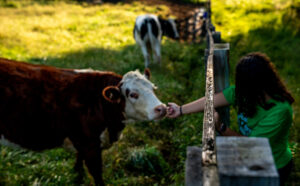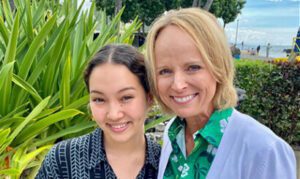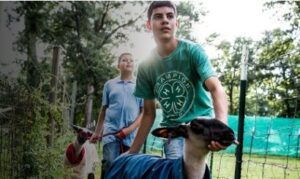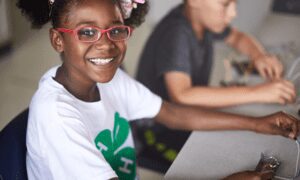Despite my role today and the great pride I have in my work, the truth is, I didn’t think agriculture was for me.
I mean like, not at all.
I grew up on a farm near the small town of Millersville, Missouri. I’m proud to say it’s the same farm my mom, dad, brother and more than 200 of the world’s finest Black Angus cows occupy today. But, as a teenager, I was convinced I wanted nothing to do with ag once I left the farm.
I worked alongside my dad many days after school, most weekends and every day during the summer. As many of you know, one scorching July of baling hay – the old-fashioned way, with square bales – can quickly turn a person off the idea of farming for a living. As I did my chores, drove tractors, cared for cows and tended to crops, I dreamed of going someplace like Chicago or New York, anywhere but Millersville.
But I learned that sometimes you can’t really appreciate what small-town America and what agriculture has to offer until you leave and come back.
My parents were horrified when I announced my intention to major in Art History and English. While reluctantly supportive, my two very practical parents put their blind faith in me and a power higher than any of us to help guide my path. But what’s really interesting is that English and Art History eventually put me on a career path that took me as far away as the high-tech PR industry in cities like Seattle, Silicon Valley, Houston, Austin and Dallas before leading me straight back to farming first at Monsanto and now at Bayer.
I started to realize what I should have known from the beginning: All the cool things my dad did on the farm, all the biology and science, I loved all that stuff. I just wasn’t very good at them from a technical perspective. But what I was good at was taking those complex ideas and translating them into concepts that were simple to understand and communicate. I can feel my dad giving me that knowing “I told you so look” right now as I write this.
And that’s what my job at Bayer now allows me to do – which is talk about some pretty mind-blowing science we create for farmers every day and explain how that science works to benefit our entire world. The wonderful things that are happening in agriculture impact everyone on the planet, and science is at the core of it all.
National Agriculture Day is a perfect moment in time to have a focused, important conversation about the intersection of science and agriculture and opportunity. And that’s what’s so awesome about 4‑H – they bring people into that conversation.
I’m proud of the work we do at Bayer and the rich tradition of every ag institution participating in National Agriculture Day. Way back when, I was a 4‑H kid. I showed steers at the local county fair, grew prize-winning tomatoes with my grandma in her garden, and went to the Southeast Missouri District Fair in Cape Girardeau to exhibit them all. My mom took me to ceramics classes through 4‑H. I learned how to tie knots and macramé. I went to summer camps where I met lifelong friends.
All these wonderful programs continue to help close the agriculture gap by showing kids what’s possible for their futures, shaping them in ways they might not even be aware of yet. In 4‑H, I even learned public speaking skills that eventually prepared me for my role in communications. Being a 14-year-old kid full of nerves speaking in front of a crowd turned out to very helpful as a professional later in life.
Now, I have kids of my own. And while they don’t seem interested in agriculture either – the way their dad was at their age – it’s hard to say where their journey will lead them. These days I feel like my own father … gently pushing the opportunities an agri-business degree might open up to them.
My dad’s got this great saying: “The older you get, the smarter I’m going to become.” So, if anything, my path proved his old adage true. My parents are proud that I’m as passionate as I am about the work I do in food and agriculture, and the way it supports the work that they and my brother do on the farm. The experiences in 4‑H helped prepare me for a life and career I’m blessed to have.
So, in an odd way, maybe we were both right.
















